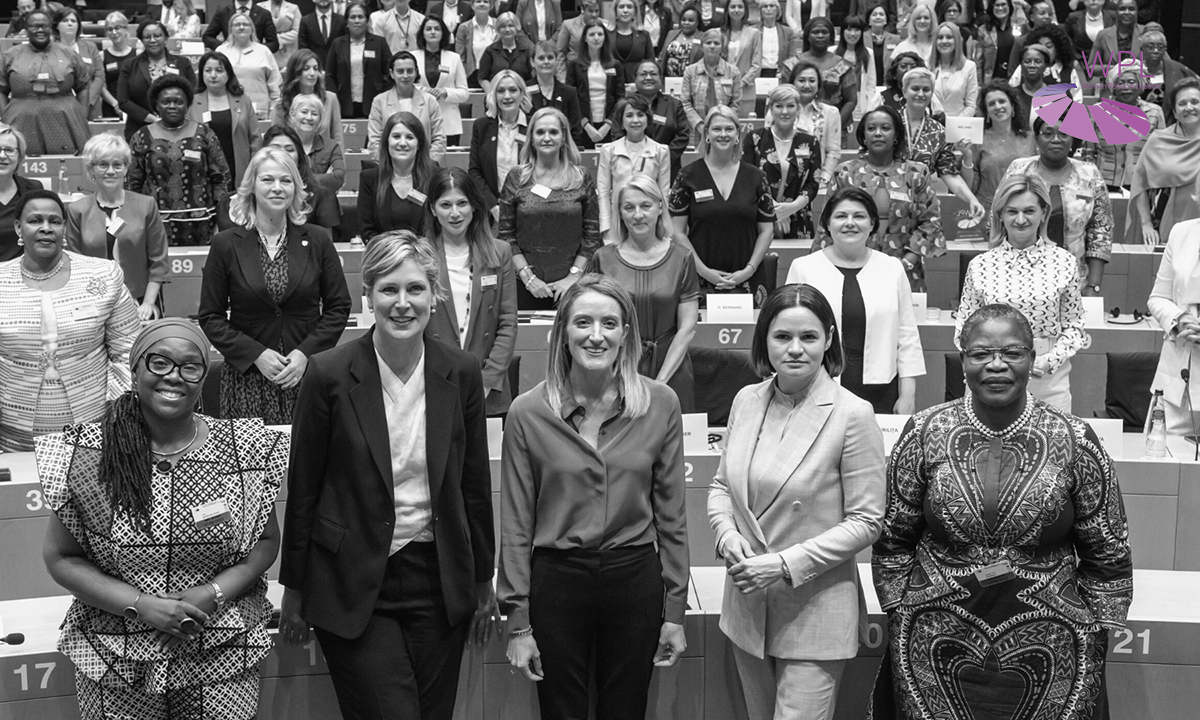Forewords
By Obiageli Ezekwesili, Chair of the WPL Board
It is with great pleasure and excitement that we present our inaugural report “Representation Matters,” which is the first of many more to come.
The role of research, especially data analytics, is now better recognized as an effective tool for more correctly identifying the underlying critical issues that persist in entrenching gender gaps between men and women in societies and across political, economic, social, and cultural spheres of life. Thus, I think this piece of analysis presented to you here is a critical one as it “connects the dots” for the first time.
The collaboration with our excellent network including Prof. Kim and the Global Institute for Women’s Leadership together with our partnership with the Oliver Wyman Forum has produced a study that provides high quality analytical evidence on the impact of women’s representation on law and policy making. It is a powerful illustration that a lot remains for us to do to ensure that men and women are truly equal.
We find that women’s political representation is closely linked to the promotion of legal equality of economic opportunity. The data suggests that only if women have significant representation (ideally parity) will we achieve legal equality of economic opportunity and unlock the benefits and economic improvements associated with this diversity. While this inaugural report has a global coverage, its findings should encourage reflections on a national level what can be done to achieve gender parity in elected parliaments.
Going forward, we plan to conduct focused research across two dimensions:
1) For specific countries to learn from successful examples where parity in representation has been achieved and led to legal equality of economic opportunity. This will allow us to derive specific recommendations for politicians to act upon on their journey to more representation of women.
2) For other policy areas such as peace and security, climate action, corruption, education, and others to assess the benefits and impacts that women’s representation will have and how more legal equality in these areas can fuel the prosperity and success of countries.
By Silvana Koch-Mehrin, President and Founder of WPL
Do women still need to justify why their leadership matters? Do we need to collect, analyse, showcase data that marks women leaders’ impact? The benefit for all of society, when more women are in power? The answer is: yes we do. Still in 2023 we need to provide proof that Representation Matters. Stereotypes and barriers specific to women mean that they today do not have the same rights as men.Women are a minority in political leadership. That matters hugely, as it is political leadership that decides on laws and regulations, that decides if women have the same rights as men.
Ten years ago, when I founded WPL, there was excitement. Many believed that WPL’s mission to increase both the number and the influence of women in political leadership could become a priority in many countries. And a lot has happened, much progress has been achieved. WPL celebrated and acknowledged it, and will continue to do so. But - unfortunately there is a but - the multiple global crises seem to remove as a priority the goal of more women in leadership. There is a roll-back, and so WPL decided to provide data giving proof of women’s impact in politics. With this study, and future editions to follow, WPL wants to showcase: more women in political leadership means solutions, means solving crises, means progress of all of society.
I would like to recognize another independent study by a WPL partner which comes to the same finding, that representation matters: Susana Malcorra, President and co-founder of GWL Voices for Change and Inclusion, and Member of the WPL Board assessed the link between female political leadership and legislation against gender-based violence (GBV) demonstrating that GBV legislation implementation is positively influenced by female political leadership.
I look forward to making Representation Matters the strategic priority for WPL’s next chapter and to bringing the data and analysis to life.
By Julia Gillard, Chair of the Global Institute for Women's Leadership at King’s College, London
We are often asked why gender equality in politics and public life is so important. In answer, we have always pointed to how fundamental it is to democracies that all citizens have a fair opportunity to become elected representatives. However, it has been more of a challenge to catalogue the specific benefits and advantages that come from women’s leadership. Until now.
The high-quality literature review conducted by the Global Institute for Women's Leadership, together with the Westminster Foundation for Democracy, shines a light on and provides a useful guide to the research projects and studies that have examined what happens when women become political leaders.
It is with tremendous pleasure that we now support WPL in its endeavour to take the next step with a data-driven approach to measure and quantify the impact of women on politics.
As the title of the WPL report boldly proclaims - “Representation Matters”. The literature review clearly evidences this conclusion. Some of the highlights of our findings include:
- Women political leaders are reshaping the nature of politics and international relations in a manner that is bringing in issues and problems previously perceived as ‘non-priorities,’ such as genderbased violence and reproductive health.
- Increased representation of women in elected office plays an important role in counteracting corruption and focusing resources on the quality and consistency of public service delivery.
- As policy makers, women are prioritising issue areas that benefit the most vulnerable in society through healthcare, welfare and education. As such, more women leaders seem to make for more equal and caring societies.
By Alice J. Kang, Associate Professor of Political Science and Ethnic Studies, University of Nebraska - Lincoln
The inclusion of a broad range of perspectives in policy making is essential for democracy, equality, and peace. Yet, worldwide, men hold a disproportionately high percentage of seats on cabinets and in legislatures. The exclusion of women and other historically marginalised groups in decision making is a challenge that nearly all countries face today.
At the same time, women have gained ground in positions of political leadership in a number of countries. Changes in the number of women political leaders have allowed academics to systematically evaluate the impact of including women on outcomes such as government health spending, post-conflict peace, and women’s economic freedom. Researchers are using the latest innovations in quantitative methods to understand whether and how representation matters.
This report shows that the greater women’s representation in cabinets and legislatures, the more women stand on equal economic legal grounds as men. It builds on the work of Professor Nam Kyu Kim, a leading scholar of political science and international relations at Korea University. Using data for up to 156 countries from 1970 to 2014, Professor Kim finds that laws that economically discriminate against women erode as the gender composition of cabinets and legislatures diversifies.
A key takeaway is that growth in women’s political leadership is crucial for women’s economic empowerment. It is insufficient for countries to rest on their laurels of exceeding past records of low women’s representation and allow for stagnation to set in. Sustained improvements in bringing marginalised groups to the decision making table, not tokenized inclusion, brings the greatest promise of legal equality of economic opportunity.
Executive Summary
There are significant differences in how well countries perform across various dimensions, including economics, education, environment, corruption, health, and security. This has been documented by numerous indices that measure and rank a country’s circumstances and progress in relation to these dimensions. Various factors impact performance, including a nation’s structure, legal system, and culture. Establishing laws and policies that address these factors is essential for a country’s progress and development.
This initial report by WPL, based on findings of the University of Korea and in partnership with King's College and the Oliver Wyman Forum shows that a country’s overall progress and performance improves when it has significant representation of women in political leadership because they often have different viewpoints and priorities than men. Increased representation of women typically results in more laws that ensure equality and greater participation of women in the workforce. Releasing the report on WPL’s 10th anniversary reinforces WPL’s mission to increase the number and influence of women in political leadership positions.
The first edition of Representation Matters shows that more inclusive legislation is passed when women are in Parliament, Minister positions, and other political roles. These laws often ensure that women (and men) are protected from discrimination, which typically increases opportunities for women to participate in the economy.
This report focuses on economics given the large gap between women and men regarding their work life — due in part to legal inequalities between men and women. Only 14 countries have equal legal rights and freedoms for women, as indicated by The Women, Business, and the Law (WBL) index,1 which measures legal equality of economic opportunity. Establishing equality between women and men in their economic participation can significantly boost the economy. For example, closing the gender gap could boost the GDP in Canada and Japan by 4%, in Pakistan by 30%, and in Niger by 32%.2 Removing legal barriers and empowering women economically should be a priority in policy making.
A recent study by Professor Nam Kyu Kim and Alice Kang from Korea University shows that increased representation of women in politics results in more legal equality between women and men.3 Specifically, they show a significant relationship between both the proportion of women in Parliament and cabinet members, and legal equality of economic opportunity, as indicated by the WBL index. They demonstrate that this significant relationship holds true even when controlling for variables, such as a country’s economic development, whether it is a democracy, and what type of legislature it is.
Our report takes the analysis further with some initial deep dives to help decision makers and larger audiences better understand how the number of women in Parliaments (as well as government positions) has changed over time and how this has impacted policy outcomes and therefore changes in the WBL index. That is, WPL aims to show: Representation matters. Voting matters. Running for office matters. Staying in politics matters.
WPL’s ambition is to start with economic legislation, and in the future build upon this to expand its work around Representation Matters to other policy areas, such as peace and security, climate action, corruption, education, and others.
Key Observations
1) Women’s political representation is closely linked to the promotion of legal equality of economic opportunity.
2) Political representation of women typically comes before legal equality of economic opportunity: It is suggested that only representation of women in the law-making process achieves this legal equality.
3) Representation of women in politics comes with overall improved economic performance, which we link to the correlation between representation and legal equality of economic opportunity.
By diving beneath the surface, our work provides insights into the significant correlation between women’s political representation and legal equality of economic opportunity.
Prologue
By the Global Institute for Women’s Leadership, King’s College
The Global Institute for Women’s Leadership at King’s College together with the Westminster Foundation for Democracy (WFD) have analysed over five hundred pieces of academic and institutional research on the ways in which women’s political careers differ from their male counterparts, what stands in their way, and what impact their political presence has on democracy and policy.
Parity of political presence between women and men is fundamental for a representative, legitimate and accountable democratic system, and our research points to the diverse and important ways that women’s political representation improves and contributes to democratic institutions and processes. It also highlights methods and approaches which address their underrepresentation. Bringing this research together in this way gives us a holistic understanding of the political recruitment and impact of women politicians that will provide a platform for future research – and we are delighted to see that WPL is now taking the next step.
Taken together, the literature presents a remarkable picture of the ways in which women are altering the political landscape. Women political leaders are reshaping the frameworks of politics and international relations. They work harder to represent their constituencies and play an important role in counteracting corruption. They are prioritising policy that benefits women, such as on equal rights and violence against women, but also policy that benefits the most vulnerable in society through healthcare, welfare, and education. More women leaders seem to make for more equal and caring societies.
Our report also points to the many constraints that women in politics still face, from violence against women in politics, to bias within political parties and persistent cultural barriers. However, it also gleans the literature for solutions to these problems and provides suggestions on how to overcome them, Our report is intended as the groundwork for future research on women’s political leadership, and we are delighted to offer our research as the prologue for this important inaugural publication of “Representation Matters.” Our literature review as well as the analysis conducted by WPL both highlight the important impact that women can have in politics. It shows that more women legislators will improve democracies by not only creating a greater responsiveness to policies important to women, but also by prioritising constituency work, using inclusive practices and refocusing politics toward issues that matter more for our day to day lives.
Some of our key findings of our literature review are the following:
Women’s political careers
- Female role models can help close the ambition gap between the genders and inspire more women to run for political office.
- Quotas – when implemented properly – are found to increase women’s representation in politics.
- Political parties are a major barrier to women’s entry into politics; they need to be part of the solution.
Women political leaders and the quality of democracy
- Women in politics tend to do more constituency work than men.
- Having more women representatives is related to lower levels of corruption.
- Women politicians are altering the framework of politics by introducing legislation previously considered beyond the scope of government, from domestic violence to female genital mutilation, but also by broadening perspectives on other policy areas.
Women political leaders and policy making
- Women in politics, more often than men, prioritise women’s interests, such as equal rights, reproductive rights and sexual health, families and childcare, and stopping violence against women.
- Women in politics also prioritise broader social ‘care’ issues more than men. This extends to women politicians spending less on military and more on aid.
- Women in politics are more able to propose and pass women friendly legislation when there is a greater proportion of women in the legislature and when there is a women’s caucus for women's parliamentary body.
Introduction: setting the scene
Countries differ vastly in how well they perform. While some have high levels of economic growth and development, others struggle with poverty and underdevelopment. Similarly, some nations have wellfunctioning democratic institutions, while others experience corruption and conflict. A country’s performance depends on many factors, including its natural resources, geography, political institutions, and social systems. Laws and policies also have a significant effect on its performance because they establish basic requirements and structural frameworks for a country’s advancement and development.
While there are many reasons why specific laws and policies are passed, (including public demand, international agreements, social and cultural norms), one important factor is political representation. As greater diversity improves the decision-making process by bringing a range of voices and perspectives to the table4, a more balanced representation of women and men in politics and political leadership should positively affect the passing of laws and policies.
For the 10th anniversary of WPL we focus on women’s political representation and economics and show that greater representation of women in politics and political leadership — through their role in law and policy making — positively impacts legislative change. Building upon previous academic research, we share our findings and key insights on the relationship between the political representation of women and legal equality between women and men, regarding their opportunities and potential to participate in the economy.
While this is not a political piece, it aims to show the importance of having women represented in politics. The report tries to make the underlying data and resulting insights accessible and appealing for political decision makers and larger audiences. It will be the basis for future analysis and research. Domains.
There are two reasons to focus on economics in this report. First, despite recent progress, the gap between women and men regarding opportunities and the potential to participate in the economy remains large. For example, female labour force participation is still nearly 30 percentage points below male labour participation.5 Additionally, women globally earn on average 20% less than men.6 Empowering women economically not only enables them to live and shape their lives to the full potential, it also has a substantial macro-economic impact For example, GDP per capita would increase by an estimated 20% if women fully participated in the labour market.
Unfortunately, women are significantly underrepresented in parliaments and governments globally, and there are still severe legal restrictions that affect a woman’s working life. Only six of 193 countries achieved political parity in parliament, and 11 countries have half (or more) of their ministerial positions held by a woman [Exhibit 1]. Additionally, 31 women currently serve as Leader of Country, which is the highest political position but not always linked with executive power. Globally, the WBL index average score in 2022 was 77 (out of 100), with only 14 countries worldwide having reached legal parity, a WBL score of 100. [Exhibit 1]. The WBL score was below 30 in three countries, showing a very limited legal standing for women.
In the remainder of this report, we focus on these two measures – female political representation and legal economic equality – and explore their relationship. We also provide projections on how quickly the path to political and legal parity will take. By sharing these findings and insights we prove: Representation matters.
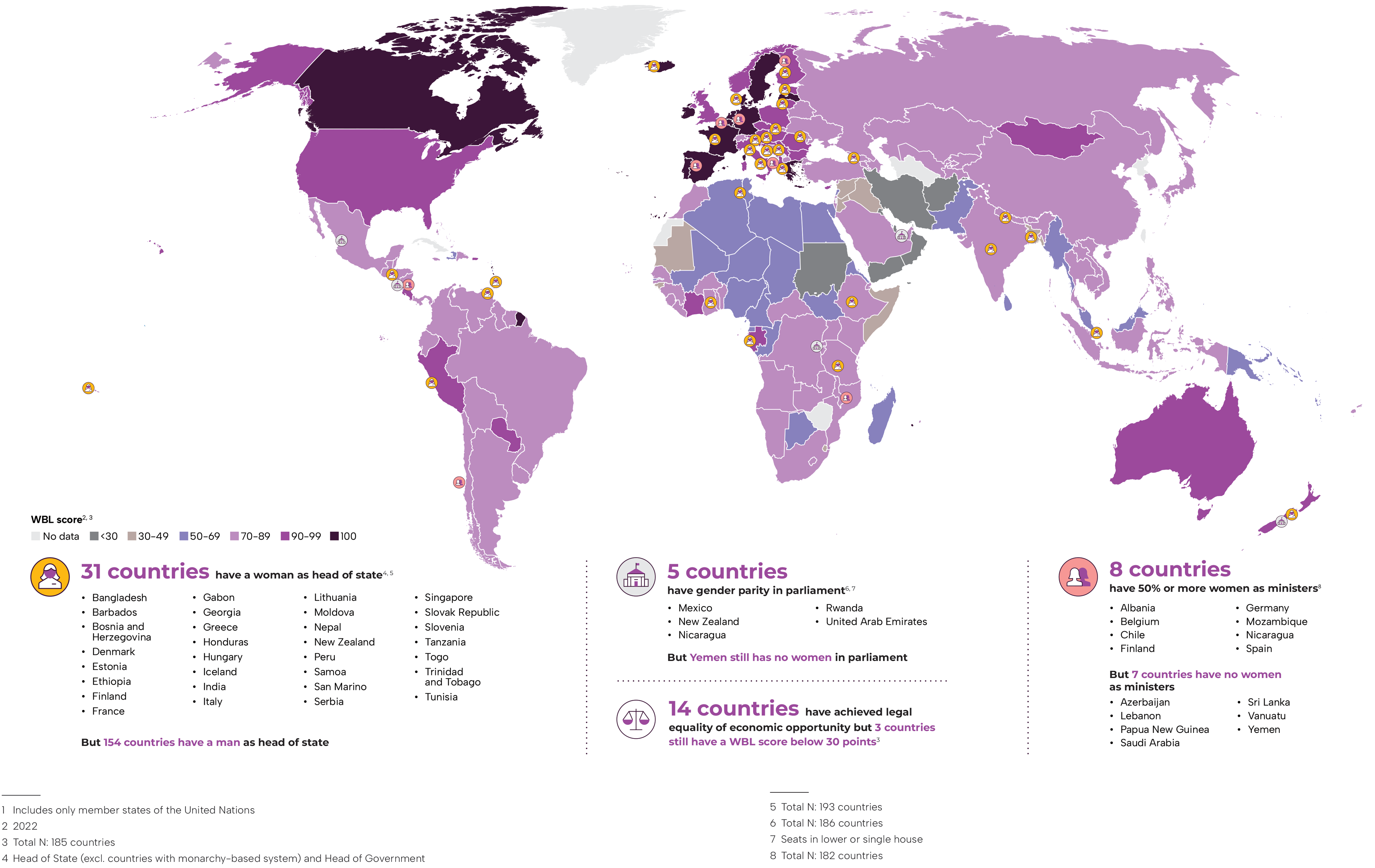
The report includes multiple measures and data sources to provide as complete a picture as possible. Given the rapidly changing reality we live in today, we acknowledge that this is only a snapshot in time and facts may have changed. In line with WPL’s guidelines, we report findings only for countries that are members of the United Nations. For the measure of legal equality between women and men in their opportunities and potential to participate in the economy, we use data from the Women, Business & the Law Index, which is published annually by the World Bank. This index measures each country's legal rights for women and men in the domains of mobility, workplace, pay, marriage, parenthood, entrepreneurship, assets, and pensions. The measures for women's political representation are based on three indicators: percentage of women in parliament, percentage of women ministers, and whether a country has a woman leader (President, Prime Minister or Chancellor), drawing upon the Nuffield Politics Research Center (WhoGov dataset)7 , Varieties of Democracy (V-dem),8 IPU Parline (IPU)9 and UNWomen.
Finding and observations
The basis of our analyses is the academic study of Prof. Kim and Prof. Kang on women’s political power and legal gender equality of economic opportunity across different contexts (2022). The study uses data from up to 156 countries between 1970 and 2015 and includes metrics of the proportion of women in national legislatures and cabinet positions. For a measure of legal gender equality of economic opportunity, the WBL index is used. Prof. Kim’s and Kang’s study finds a significant correlation between women’s representation in politics and the legal equality of economic opportunity. Notably, the correlation remains true under various contexts, such as different socio-economic factors (economic development), political factors (level of democracy) and development status of a country.
1) Women’s political representation is closely linked to the promotion of legal equality of economic opportunity.
The data show a clear relationship between the political representation of women and legal equality between women and men, regarding their opportunities and potential to participate in the economy. Countries with a higher number of women in parliaments and minister positions have, on average, more inclusive laws that promote equal treatment of women and men regarding their economic opportunities, as indicated by a higher WBL score. The average WBL score for countries that have 50% or more women in parliament is 10 percentage points higher than in countries that have not yet reached parity in parliament [Exhibit 1]. In countries with at least half of minister positions filled with women, the average WBL score is 17 percentage points higher than for those countries that have fewer female ministers. Additionally, the average WBL score for countries in which a woman is the leader is 10 percentage points higher than in countries with a man as the leader of the country. These findings are in line with the academic study by Kim (2022) that shows a strong positive correlation between political representation by women and legal equality of economic opportunity.
When taking an even closer look at the relationship between the representation of women in politics and the passage of more inclusive laws and policies in some countries, we find that women play a significant role in the change for legal equality.
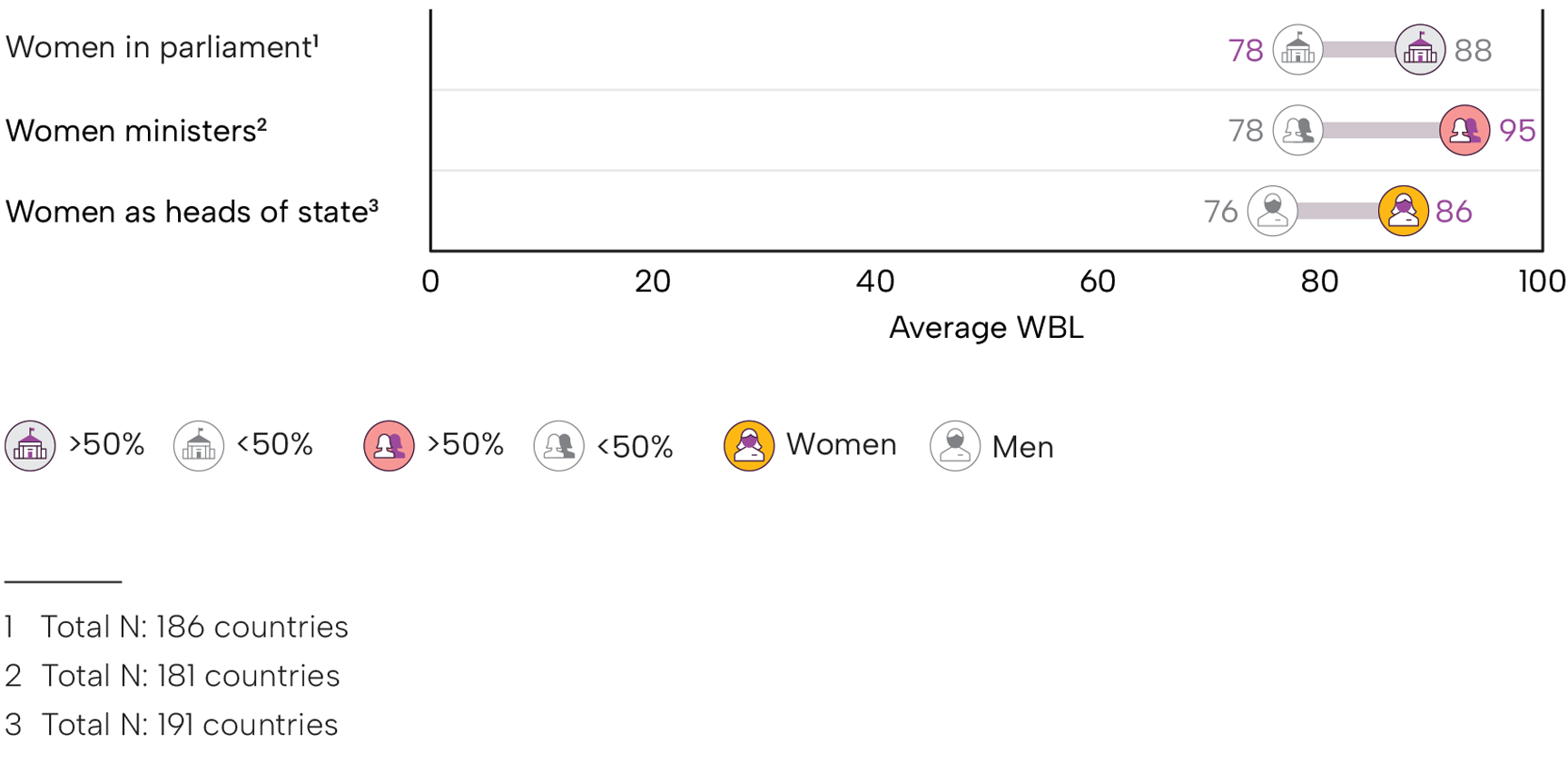
There are several ways in which women might influence political discussions:
- First, they bring new issues to the political agenda that would otherwise have been neglected.
- Second, they challenge stereotypes, which may influence the way issues are discussed and perceived.
- Third, they promote more collaborative discussions and decision-making, which could result in more inclusive outcomes.
The representation of women in politics is a driving factor in our path to legal equality.
2) Political representation of women typically comes before legal equality of economic opportunity: It is suggested that only representation of women in the law-making process achieves this legal equality.
Political parity, as indicated by a balanced representation between women and men in parliaments, minister positions, and as leader of a country or government, also may boost a nation’s overall economy. Even though such macro-economic effects are challenging to assess, the data indicates that representation in politics is related to a country’s overall economic performance.
Globally, 14 countries have reached legal economic equality (2022), as indicated by a WBL score of 100. These countries also show a strong economic performance, with a GDP per capita above the global average of $12,237 US (2021) [Exhibit 3].
These findings are only an observation and further analysis is needed but a relationship between the representation of women in politics and a boost in economic performance seems likely. As more laws and policies are passed that prohibit discrimination against women, they are more likely to participate in the economy, increasing workforce participation rates, lowering unemployment, and reducing poverty.
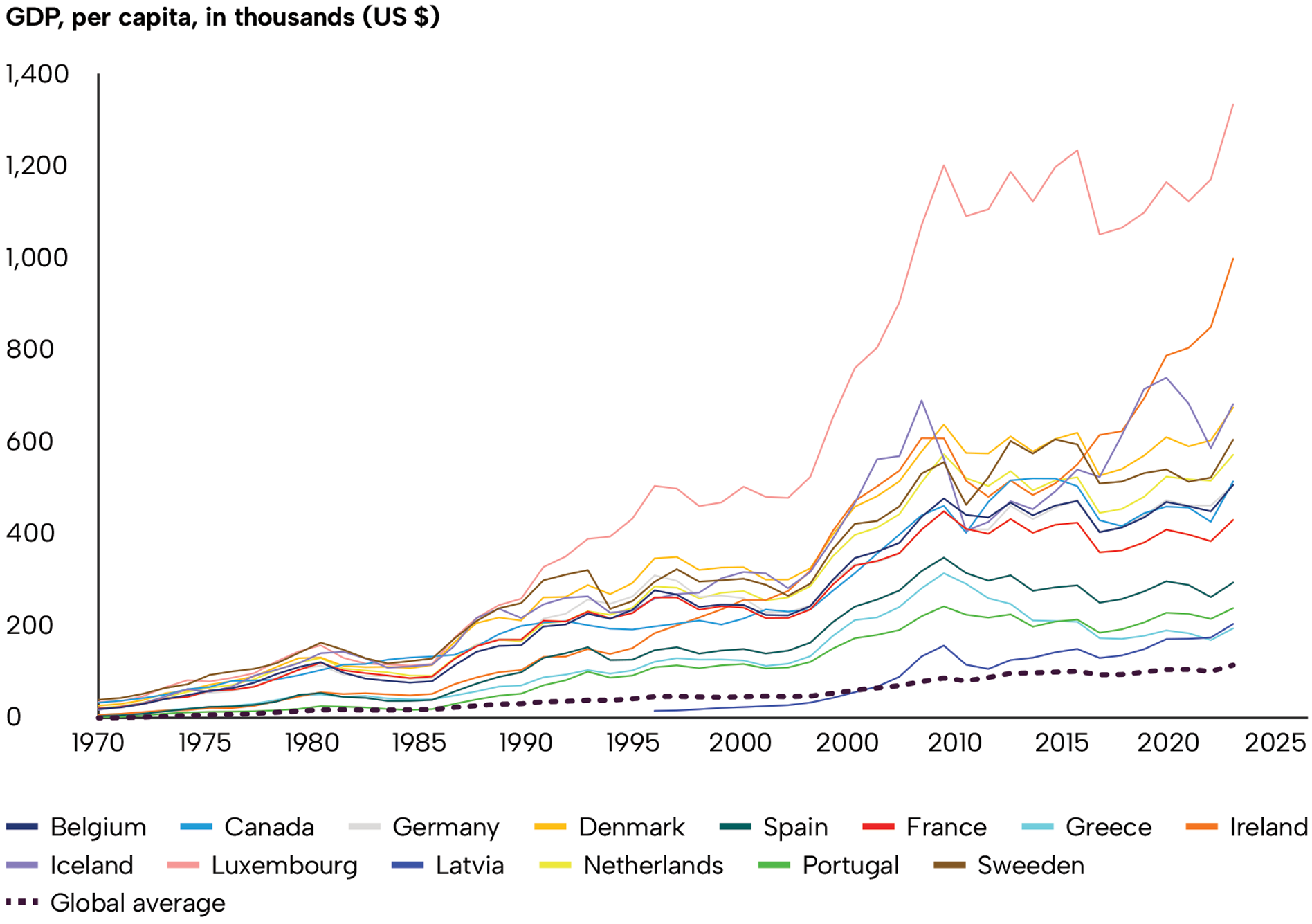
3) Representation of women in politics comes with overall improved economic performance which we link to the correlation between representation and legal equality of economic opportunity.
The path to political parity is long. At the current rate of growth, political parity and legal equality will likely not occur for another 30 years (under the assumption of an annual global average growth rate of 1% for WBL and 3% for both women in parliament and ministers and 9% for women as leader of a country or government, which is more optimistic thinking than likely to happen, given the current roll-back) [Exhibit 4]. Interestingly, when projecting the development of both women’s political representation and WBL into the future, we find that political parity (balanced representation between women and men in parliaments, ministerial positions, and as leader of a country or government) will on average be achieved before legal equality between men and women (WBL score of 100 for all countries).
When looking at the development of the different continents, we find differences in their projected trajectories [Exhibit 5]. Given the current average growth rates (2000-2023), the Americas and Europe would be the first to reach political parity around 2043, closely followed by Africa in 2046. That means both the number of women in parliament and the number of women as ministers are on average at 50% or more. While political parity in Africa and the Americas would be achieved before legal equality between women and men, a different picture emerges in Europe, where legal equality between men and women will most likely be achieved before a balanced representation of women and men in politics.
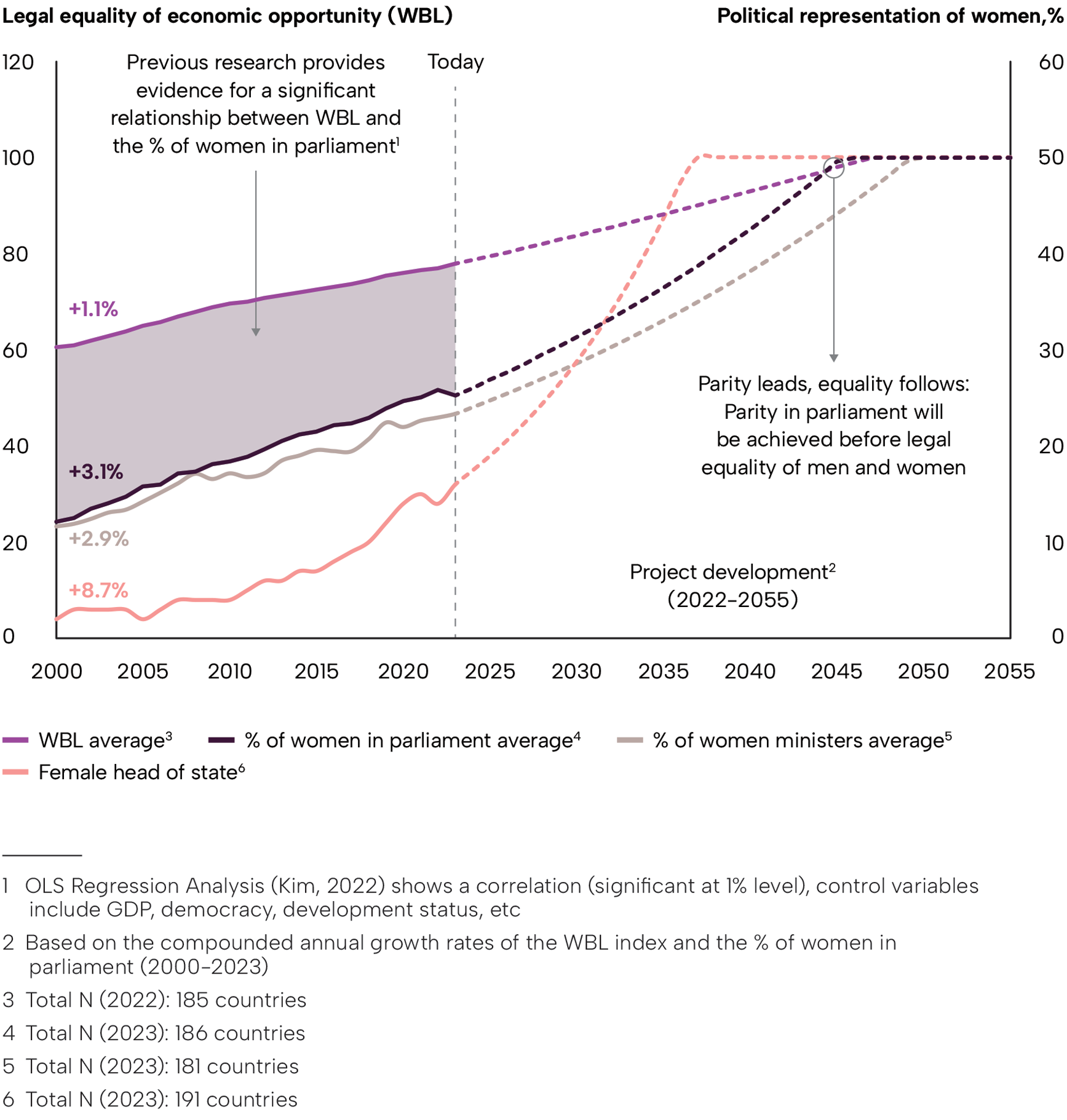
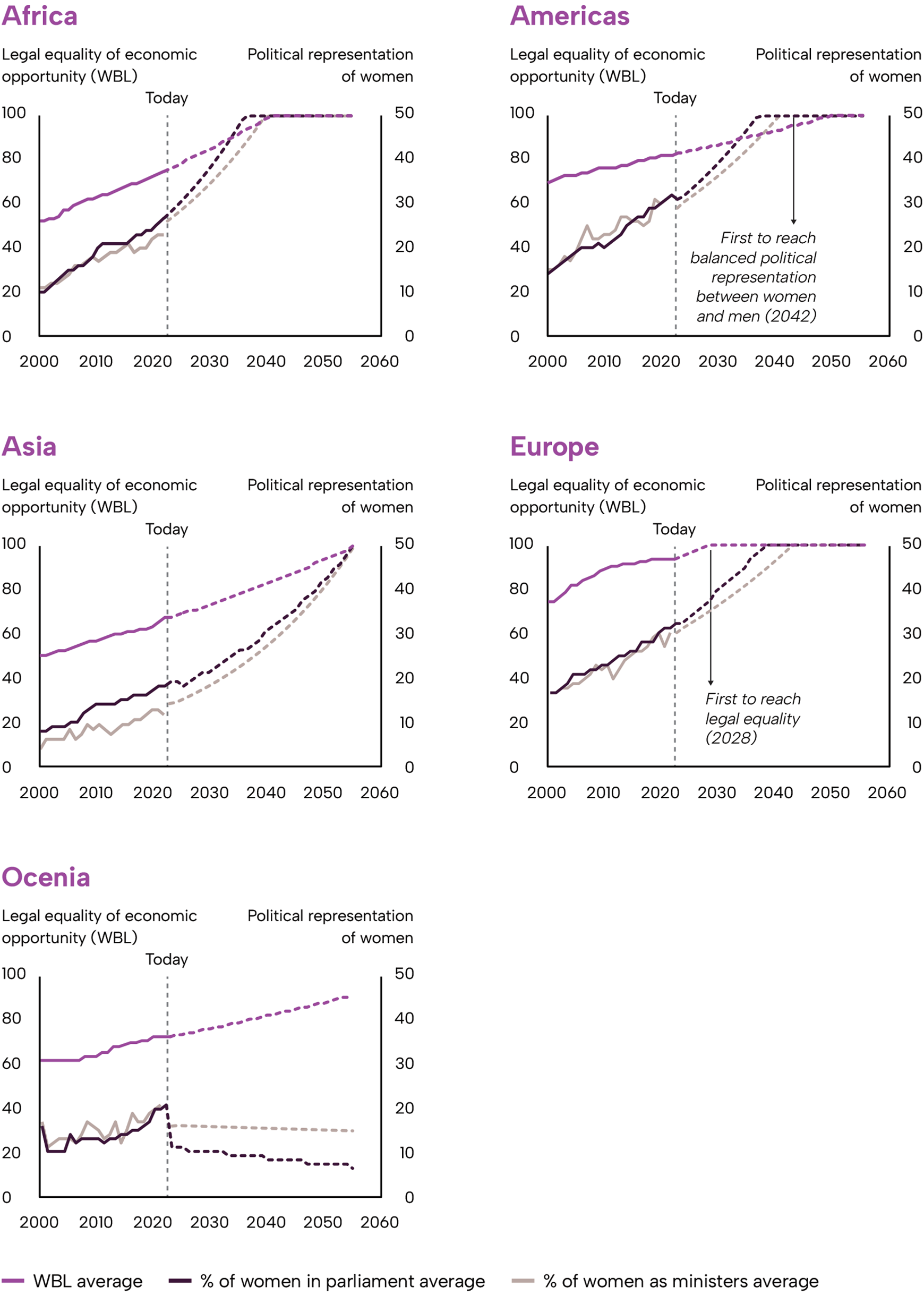
Representation Matters — the path forward
The data confirms our most important hypotheses: Representation matters. It matters fundamentally in the political decision-making context.
While women are still severely underrepresented in politics, – they globally do not have the same legal rights as men regarding their opportunities and potential to participate in the economy at the same time.
Based on our findings – as well as the academic study by Prof. Kim and Prof. Kang we see a strong relationship between the two. That is, the higher the number of women in politics and political leadership, the greater the legal equality between women and men is in the economical domain.
But we need far more women in politics and political leadership to significantly increase the number of laws treating men and women equally. Governments and political administrations should make a conscious effort to have more women in politics and to strive for political parity [Exhibit 6]. Thus, our core call to action is to have more women elected – only by having women actively take part in the political system and represent their constituents, legal equality can truly be achieved. This will likely not only increase legal equality between women and men regarding their opportunities and potential to participate economically but also positively impact the wider economy. The way to get women elected will differ by country, but it is essential if we want to build a more inclusive, egalitarian, and just society.
We also want to take the opportunity to highlight the key actions resulting from the publication “Women political leaders: the impact of gender on democracy” published by The Global Institute for Women’s Leadership at King’s College London together with the Westminster Foundation for Democracy summarised in the prologue to this report and applicable for our findings in driving more representation of women in the political landscape:
- Think about & introduce quotas and positive measures at the national and/or party level.
- Reconfigure political institutions to be more gender sensitive.
- Ensure political institutions accommodate the caring responsibilities of their members.
- Set up (cross-party) women’s parliamentary bodies.
- Ensure women’s organisations and movements work together with women in parliament.
We acknowledge that the findings in this report are only a first step in assessing and showing the impact of ‘Representation Matters’. More detailed analyses are needed to further support our hypotheses – an avenue for future research that WPL is committed to conduct. Nevertheless, this report provides a first insight into the importance of women’s political representation in our path toward legal equality between men and women. It shows that representation matters. Voting matters. Running for office matters. Staying in politics matters.
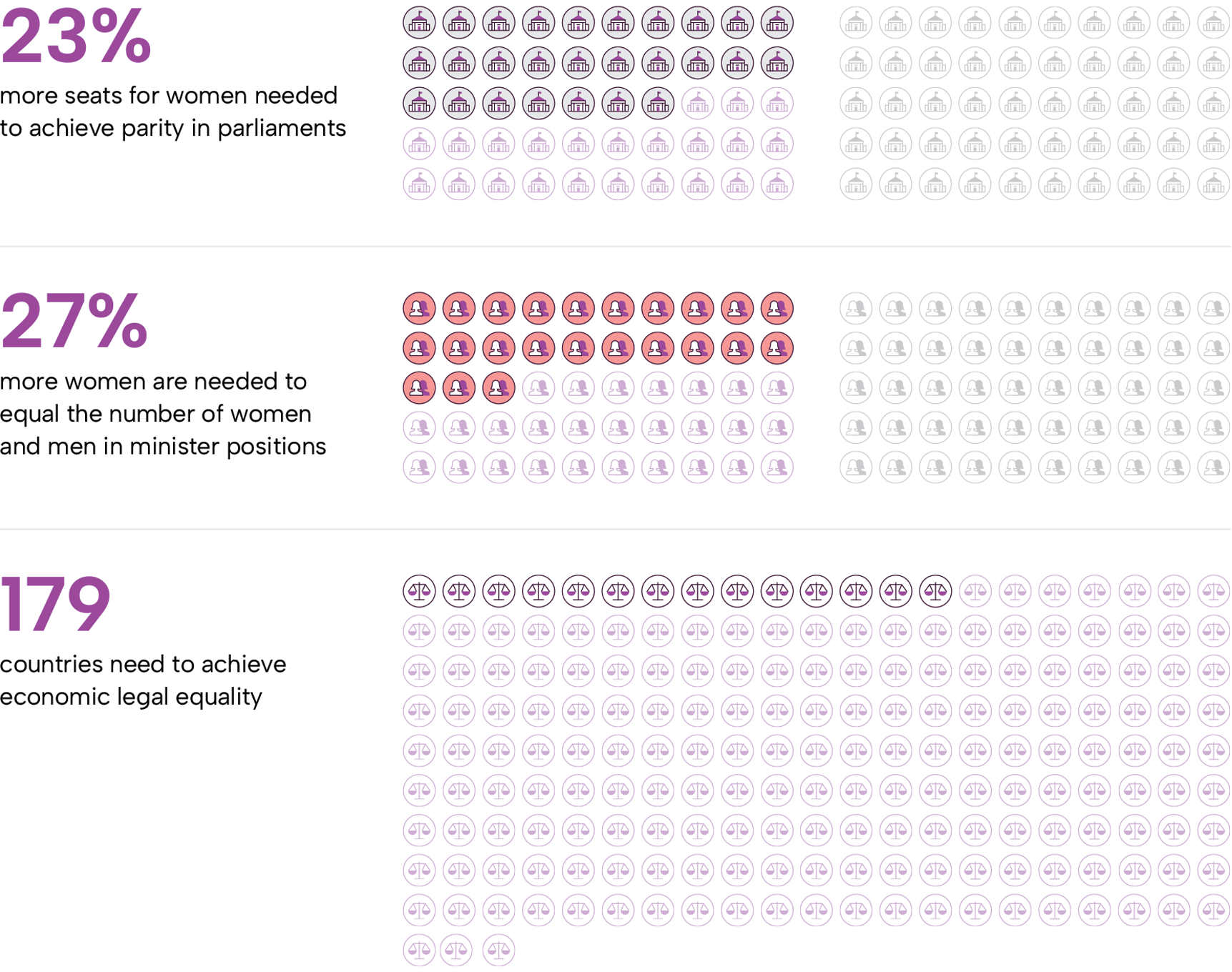
Epilogue
By Dominik Weh, Oliver Wyman Forum
On behalf of the Oliver Wyman Forum, I am delighted to have supported Women Political Leaders with this strategically important inaugural report for “Representation Matters.” It demonstrates the importance of electing women to our parliaments and broader political systems.
I want to express my gratitude for the great collaboration and partnership over recent months. It was an intense and powerful process with many productive iterations that resulted in a strong, convincing, and sound conclusion.
The journey also showed that much more must be done, and we are eager to dig deeper into the available data and to add personal stories to this ongoing research. Thus, it is with great excitement that I look to building on this high-quality foundation and developing more research to support WPL’s endeavour to increase both the number and the influence of women in political leadership positions.
This is only the first of what we plan to be a series of reports and recognize that it depends in part on data that used only two categories of gender identity.
Acknowledgements
This report was created as part of an Oliver Wyman For Society Social Impact project. Oliver Wyman partners with organizations whose work improves communities and lives around the world through microfinance, healthcare, education, global economic development, the arts, and much more.
This report builds on work done by other institutions that generously provided their data for further analysis, to produce the insights presented here. In particular, we want to acknowledge and express our gratitude to the following:
- Prof. Nam Kyu Kim from Korea University and Prof. Alice Kang from University of Nebraska-Lincoln, whose research and insights are the academic foundation of our report.
- Prof. Rosie Campbell and Minna Cowper-Coles, Visiting Research Fellow from The Global Institute for Women’s Leadership at King’s College London together with the Westminster Foundation for Democracy (WFD) for providing their research and literature review to support our findings.
- The Westminster Foundation for supporting the work of The Global Institute for Women’s Leadership.
- Inter-Parliamentary Union (IPU) and UN Women, for providing annual quantitative data on women in national Parliaments, Ministerial positions, Leader of Country and Leader of Government Positions.
- The World Bank, for its annual “Women, Business and the Law” publication WPL would like to thank its strategic partner, the Oliver Wyman Forum, for preparing the study.
Citations
2. The World Bank, “The World Bank in Gender”, 2023
4. Forbes, “3 Benefits of Diversity in the Workplace”, 2021
5. The World Bank, “Female Labour Force Participation”, 2022
6. International Labour Organisation, “Pay transparency can address the gender pay gap”, 2022
7. Nuffield Politics Research Centre, “WhoGov dataset”, 2023
8. Varieties of Democracy, “V - Dem dataset”, 2023
9. IPU Parline, “Global data on national parliaments”, 2023
10. UN Women, “Women Count”, 2023
11. International Monetary Fund, “Pursuing Women’s Economic Empowerment”, 2018

